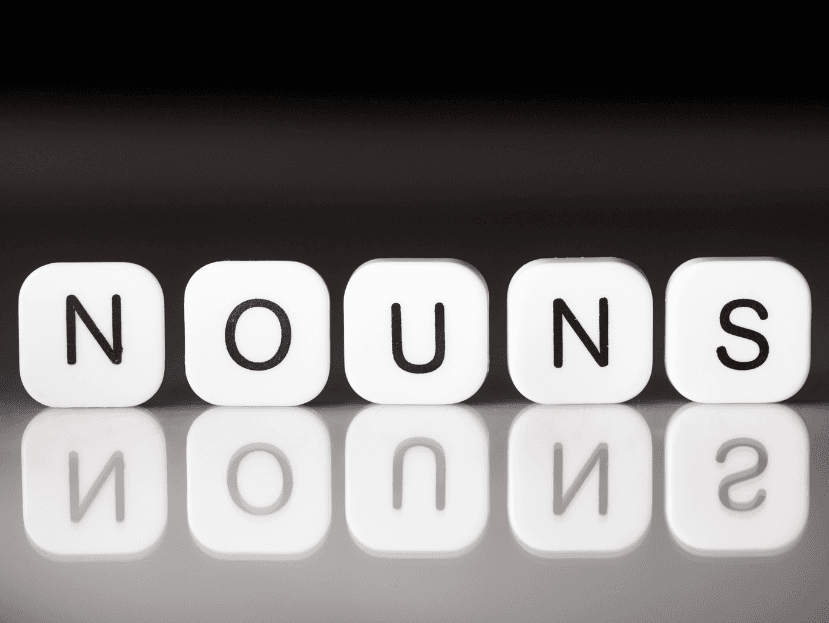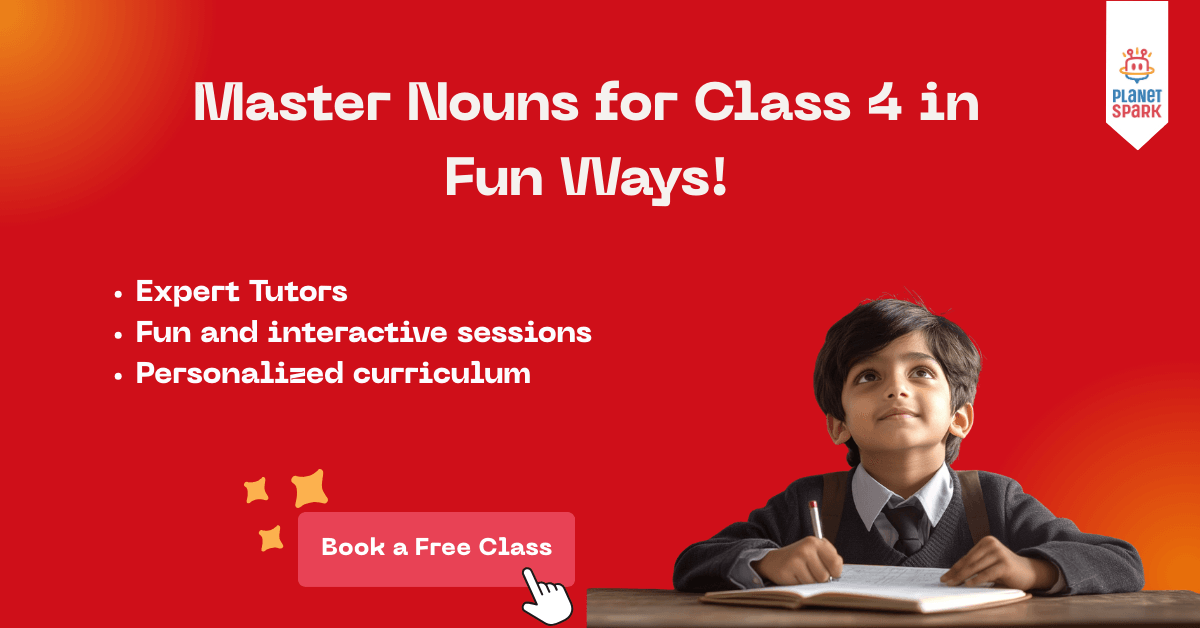Nouns for Class 4: Types, Examples, and Worksheet for Practice

From naming people and places to objects and ideas, nouns form the foundation of every sentence your child writes or speaks. Understanding nouns for class 4 early not only boosts grammar confidence but also strengthens reading and writing abilities in school.
With the right guidance and practice, even tricky concepts become simple and fun. PlanetSpark’s interactive learning approach helps children grasp these concepts effortlessly while enjoying the process.
Why Understanding Nouns Is Important for Class 4 Students
Nouns are the building blocks of sentences. They help children identify and name people, places, animals, objects, and ideas, making communication clearer and more effective. Mastering nouns at an early stage lays a strong foundation for writing stories, essays, and daily schoolwork with confidence.
To make learning even easier, we have added a noun worksheet for class 4 for you. This worksheet provides simple exercises that help reinforce concepts in a fun and interactive way, ensuring your child not only learns but also enjoys practicing nouns.
Types of Nouns for Class 4
Understanding the different types of nouns helps children use them correctly in sentences. Here are the main types of nouns that every class 4 student should know:
1. Common Nouns
Common nouns refer to general names of people, places, or things. They are not capitalized unless they begin a sentence. These nouns are everywhere in daily life.
Examples:
- person: teacher, doctor, friend
- place: park, library, city
- thing: pencil, table, bag
Sentence Examples:
- The teacher explained the lesson.
- We went to the park yesterday.
- I kept my bag on the chair.
Tip for Practice: Ask children to write down 10 common nouns they see around their home or school each day.

Unlock Your Child’s Grammar Potential Today!
Book a free demo and see how PlanetSpark makes learning nouns for class 4 fun and effective.
2. Proper Nouns
Proper nouns name specific people, places, or things. They always start with a capital letter, no matter where they appear in a sentence.
Examples:
- people: Aryan, Neha, Albert Einstein
- places: Mumbai, Eiffel Tower, PlanetSpark
- things: Olympics, Diwali, Mona Lisa
Sentence Examples:
- Neha won the painting competition.
- We plan to visit the Eiffel Tower next year.
- PlanetSpark helps children improve English skills.
Tip for Practice: Have students make a list of proper nouns from their favourite books, shows, or family members.
3. Concrete Nouns
Concrete nouns are nouns that can be experienced using the five senses. Children can see, touch, hear, taste, or smell these nouns.
Examples:
- things: chair, cake, smartphone
- animals: cat, elephant, parrot
- objects in nature: river, mountain, flower
Sentence Examples:
- The cat slept on the sofa.
- She ate a delicious cake at the party.
- The river flowed swiftly after the rain.
Tip for Practice: Encourage children to pick 5 concrete nouns around them and describe them in one sentence each.
4. Abstract Nouns
Abstract nouns represent ideas, emotions, or qualities that cannot be seen or touched. These help children express thoughts and feelings in writing.
Examples:
- emotions: happiness, sadness, fear, excitement
- qualities: honesty, bravery, patience, kindness
- concepts: freedom, knowledge, friendship
Sentence Examples:
- Happiness is seeing your friends smile.
- Her bravery impressed everyone in the class.
- Friendship is one of life’s greatest treasures.
Tip for Practice: Ask children to write sentences about their feelings using abstract nouns like joy, love, or courage.
5. Collective Nouns
Collective nouns are words that name a group of people, animals, or things. They help children speak more accurately about groups.
Examples:
- people: team, audience, staff
- animals: flock, herd, pack
- things: bunch, set, collection
Sentence Examples:
- A team of players practiced for the match.
- The herd of elephants crossed the river.
- I bought a bunch of bananas from the market.
Tip for Practice: Play a game where children identify collective nouns from storybooks or classroom objects.
6. Material Nouns
Material nouns name the substance or material from which objects are made. They are important when describing objects in detail.
Examples:
- metals: gold, silver, iron
- natural materials: water, wood, cotton
- man-made materials: plastic, glass, paper
Sentence Examples:
- The necklace is made of gold.
- She wore a dress made of soft cotton.
- The bottle is made of plastic.
Tip for Practice: Children can make a “Material Noun Chart” of 10 items at home or school and identify what they are made of.

Boost Your Child’s Confidence in Grammar!
Try a PlanetSpark demo and discover how easy mastering nouns can be.
Why Practicing Nouns Matters
Understanding nouns is important, but practicing nouns for class 4 is what truly helps children remember and use them correctly. Regular practice strengthens grammar skills, improves sentence formation, and boosts confidence in reading and writing. When children practice, they learn to spot nouns in everyday language, making communication clearer and more accurate.
To make practice enjoyable and effective, we have added a noun worksheet for class 4 for you. This worksheet includes engaging exercises like identifying, categorizing, and using different types of nouns in sentences. By working on these exercises, children reinforce their learning, retain concepts longer, and enjoy mastering grammar step by step.
Importance of Nouns for Class 4
Nouns are the backbone of language. For Class 4 students, understanding nouns for Class 4 is crucial because they form the building blocks of every sentence. Without nouns, children would struggle to name people, places, objects, or ideas, making communication unclear and incomplete.
Here’s why learning nouns matters:
Improves Sentence Formation: Knowing nouns helps students create complete and meaningful sentences.
Enhances Reading and Writing Skills: Identifying nouns in texts strengthens comprehension and writing accuracy.
Boosts Vocabulary: Learning different types of nouns expands a child’s word bank, making their communication more expressive.
Supports Grammar Mastery: Understanding nouns lays the foundation for learning other parts of speech like verbs, adjectives, and pronouns.
Builds Confidence: Children who can identify and use nouns confidently are more self-assured in speaking, storytelling, and writing activities.
Noun Chart for Class 4
| Type of Noun | Definition | Examples | Sentence Example |
|---|---|---|---|
| Common Nouns | Names general people, places, or things | girl, school, book | The girl is reading a book at school. |
| Proper Nouns | Names specific people, places, or things; always capitalized | Rohan, Delhi, PlanetSpark | Rohan visited Delhi last summer. |
| Concrete Nouns | Things that can be seen, touched, heard, smelled, or tasted | apple, dog, chair | The dog barked at the apple on the floor. |
| Abstract Nouns | Ideas, feelings, qualities, or concepts that cannot be sensed | happiness, courage, freedom | Courage helped her climb the hill. |
| Collective Nouns | Words that name a group of people, animals, or things | team, flock, bunch | A flock of birds flew across the sky. |
| Material Nouns | Substances or materials from which objects are made | gold, water, cotton | The necklace is made of gold. |
Tip: To reinforce these types, we have added a noun worksheet for class 4 for you, which lets students practice identifying and using each type in fun exercises.
Tips to Master Nouns for Class 4
Learning nouns becomes fun and effective when children follow simple strategies. Here are some practical tips to help Class 4 students master nouns for class 4:
Read Every Day: Encourage children to read storybooks, articles, or short passages. While reading, they can highlight nouns they find, reinforcing recognition naturally.
Make a Noun List: Children can create a personal notebook to list new nouns they encounter, categorized by type: common, proper, abstract, and more.
Use Nouns in Sentences: Writing sentences using new nouns helps kids remember their meanings and uses.
Play Grammar Games: Turn learning into fun with games like “Noun Hunt” or “Guess the Noun,” which make identification interactive.
Practice with Worksheets: Structured practice is essential. We have added a noun worksheet for class 4 for you, offering exercises to identify, classify, and use nouns in sentences. Regularly completing these worksheets improves confidence and mastery.
Speak and Describe: Encourage children to describe objects, people, or places around them using appropriate nouns. This reinforces practical usage in everyday communication.
By combining reading, writing, games, and worksheets, children can confidently master nouns for class 4 while enjoying the process.
Common Mistakes to Avoid While Learning Nouns
Even when students understand nouns, certain mistakes can slow down their learning. Highlighting these pitfalls can help Class 4 students master nouns for class 4 more effectively.
Confusing Common and Proper Nouns: Children sometimes forget to capitalize proper nouns, like names of people, cities, or brands.
Mixing Singular and Plural Forms: Using the wrong singular or plural form can make sentences grammatically incorrect.
Example: The childs are playing → The children are playing.
Overlooking Abstract Nouns: Students often struggle to identify nouns that cannot be seen or touched, like happiness, freedom, or courage.
Ignoring Collective Nouns: Groups like “team” or “flock” are sometimes mistaken for singular or plural incorrectly.
Limited Practice: Without regular exercises, children may forget the types and uses of nouns.

How PlanetSpark Helps Children Master Nouns
Learning grammar can be challenging, but the right guidance makes all the difference. PlanetSpark offers interactive and engaging programs designed to help children confidently learn nouns for class 4 and other grammar concepts.
With PlanetSpark, children benefit from:
Expert Guidance: Certified educators explain concepts clearly and in a child-friendly way.
Interactive Lessons: Activities, games, and examples make learning nouns fun and memorable.
Practice Opportunities: Worksheets, quizzes, and exercises reinforce each lesson, ensuring children retain what they learn.
Confidence Building: Regular practice and positive reinforcement help students speak and write English confidently.
Conclusion
Mastering nouns for class 4 is a vital step in building strong grammar skills and confident communication. Understanding the different types of nouns and practicing them regularly helps children read, write, and speak with clarity. With tools like noun worksheet for class 4, learning becomes structured, interactive, and enjoyable. By combining lessons, practice exercises, and fun activities, students can strengthen their English skills and build a strong foundation for all future learning.
Readers Also Read
Rules of Pronouns for Class 4 – A complete guide to help your child understand and use pronouns correctly in sentences.
3 Types of Prepositions That a Class 4 Kid Must Know – Learn how prepositions work and how to use them effectively in daily writing and speaking.
FAQs
Q1: What are nouns for class 4?
Nouns for class 4 are words that name people, places, animals, things, ideas, or groups. They are the building blocks of sentences and help children communicate clearly.
Q2: How can my child practice nouns effectively?
Regular practice through reading, writing, games, and worksheets is the best way. We have added a noun worksheet for class 4 for you to help children identify, classify, and use nouns in fun exercises.
Q3: Why is learning nouns important for Class 4 students?
Learning nouns improves sentence formation, vocabulary, reading comprehension, and writing skills. It also builds confidence in speaking and storytelling.
Q4: What types of nouns should Class 4 students know?
Students should learn common nouns, proper nouns, concrete nouns, abstract nouns, collective nouns, and material nouns. Practicing these regularly ensures mastery.
Q5: Can PlanetSpark help with learning nouns?
Yes! PlanetSpark offers interactive lessons, expert guidance, and worksheets that make learning nouns and other grammar topics fun, engaging, and effective.
Personalized Communication Report
Record a video to get a AI generated personalized communication report for your child

Hi There, want to try these
tips for your child with
LIVE with our expert coach?
Let's check your child's
English fluency
